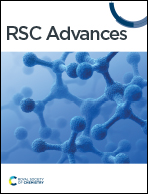Surface engineering of carbon microspheres with nanoceria wrapped on MWCNTs: a dual electrocatalyst for simultaneous monitoring of molnupiravir and paracetamol†
Abstract
In the present study, nanoceria-decorated MWCNTs (CeNPs@MWCNTs) were synthesized using a simple and inexpensive process. Molnupiravir (MPV) has gained considerable attention in recent years due to the infection of severe acute respiratory syndrome coronavirus-2 (SARS-CoV-2). Since some people infected with COVID-19 experience fever and headaches, paracetamol (PCM) has been prescribed to relieve these symptoms. Therefore, there is an urgent need to monitor and detect these drugs simultaneously in pharmaceutical and biological samples. In this regard, we developed a novel sensor based on nanoceria-loaded MWCNTs (CeNPs@MWCNTs) for simultaneous monitoring of MPV and PCM. The incorporation of CeNPs@MWCNTs electrocatalyst into a glassy carbon microsphere fluorolube oil paste electrode (GCMFE) creates more active sites, which increase the surface area, electrocatalytic ability, and electron transfer efficiency. Interestingly, CeNPs@MWCNTs modified GCMFE demonstrated excellent detection limits (6.0 nM, 8.6 nM), linear ranges (5.0–5120 nM, 8.0–4162 nM), and sensitivities (78.6, 94.3 μA μM−1 cm−2) for simultaneous detection of MPV and PCM. The developed CeNPs@MWCNTs electrocatalyst modified GCMFE exhibited good repeatability, anti-interference capability, stability, and real-time analysis with good recovery results, which clearly indicates that it can be used for real-time industrial applications.



 Please wait while we load your content...
Please wait while we load your content...